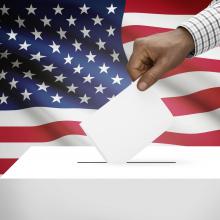1965

Dr. Deborah Turner of the League of Women Voters (LWV), Rabbi Jonah Pesner of Religious Action Network, Virginia Kase Solomón of LWV, Rev. Melvin Wilson of Saint Matthew AME Church, and Ben Jealous of People for the American Way lead a civil disobedience action during a voting rights rally at the White House. LWV, People for the American Way, Black Voters Matter, and many other organizations hosted the rally to pressure Congress and President Biden to protect voting rights after many states passed laws to make voting more difficult for minorities. Photo by Allison Bailey/NurPhoto via Reuters.
The House of Representatives passed HR 4, known as the John Lewis Voting Rights Advacement Act, 219-212, which faith leaders and other voting rights advocates believe is a crucial step in voter protection.
“Tireless hours by members of Congress and civil rights leaders have brought the issue of federally mandated voter suppression to the forefront of conversations around American democracy,” Rev. Al Sharpton said in a news release through March On For Voting Rights. “This is only the start of the fight to move farther and farther away from the Jim Crow Era.”
Who is scorched worse,
the one who dives to take the bullet,
the one who shoots,
or the woman spared?
Take Ruby Sales, for example—
how she and Jonathan Daniels,
thirsty from heat and the Hayneville jail
stop for a cold soda on their way out of town.
Deputy Tom Coleman is angry, is ready;
he aims his gun pointblank at Ruby.
Daniels sees it coming, pushes Ruby over
throws his body in bullet’s path.
Editor's note: Sales, founder of the SpiritHouse Project, is a nationally recognized human rights activist and public theologian. Coleman was acquitted of the death of Jonathan Daniels by an all-white jury and died in 1997.

Image via Niyazz/Shutterstock
Today is the 50th anniversary of the landmark Voting Rights Act, passed Aug, 6, 1965. The act, signed into law by President Lyndon B. Johnson, created key provisions to prevent racial discrimination in voting laws.
The Voting Rights Act has been called "the single most effective piece of civil rights legislation ever passed by Congress."
Today's anniversary is a bittersweet commemoration. In 2013, the Supreme Court struck down Section 4, which had required Alabama, Alaska, Arizona, Georgia, Louisiana, Mississippi, South Carolina, Texas, and Virginia to seek federal approval before imposing changes to voter laws.
I liked this film so much I've already seen it twice. Moonrise Kingdom is so good, in fact, I almost couldn't bring myself to write about it for fear of not doing it justice.
And yet, since I first took my 11-year-old nephew, Ethan, to see it last month, I've been talking about Moonrise Kingdom nonstop, encouraging everyone I know to go see it. It has captured my imagination completely, an absolute tour de force — wholly original and an "instant classic," as I heard one film critic utter tell a companion on his way out of the theater.
Perhaps Ethan, a mythology buff who's never met a fantasy film he didn't like, put it most eloquently when he said (surprising no one more than himself), "That was the best film I've ever seen."
Moonrise Kingdom is director Wes Anderson's seventh feature-length film to date. In an iconoclastic cinematic oeuvre unrivaled among filmmakers of his generation, Anderson's latest stands above the rest of his stellar films — Bottle Rocket, Rushmore, The Royal Tennenbaums, The Life Aquatic with Steve Zissou, Fantastic Mr. Fox and Darjeeling Limited — as an eloquent, funny, enduringly poignant homage to childhood and, moreover, to innocence.
In a word, the film is perfect. I wouldn't change a thing.

